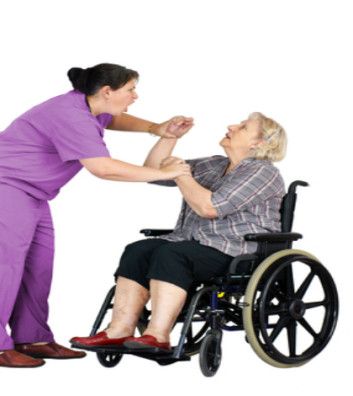Caregiver Tips for the Early Stages of Dementia
Providing care for a loved one in the early stages of dementia can be challenging. Learn about physical, financial, and cognitive signs to look for and how to ensure a safe and comfortable environment for your family member with dementia.

Providing care in the early stages of dementia is a very difficult task for many family members. The person with dementia still is aware. They are aware enough to know that they are not functioning as they normally would. There is denial and a continued fight to remain independent.
If you are providing care for someone in the early stages of dementia... Alzheimer’s, or MCI (mild cognitive impairment)... your family member may progress from being totally independent and slowly decline.
Sometimes, the caregiver delays stepping in. Often, because the family member with dementia often believes they are doing better than they really are. It’s the nature of dementia... for sufferers to demand independence when in reality their judgment is significantly impaired.
This is often the case when adult children take on the care of their mother or father. As your family member begins to decline... you will need to be aware that there will be an increased dependency. We have developed a list of things to look for that would indicate you should consider stepping in.
PHYSICAL SIGNS
- You may observe that there is some difficulty with walking. Your family member may begin to hold onto furniture or walls when ambulating.
- Frequent falls or unsteadiness may begin to occur. You may see the presence of bruises or skin tears.
- You will begin to notice a decline in personal hygiene or grooming. Your family member may start to ... wear stained clothes, have body odor, infrequently bathes or washes hair. They may begin to wear the same clothes day after day. They may dress inappropriately for the weather.
- You may observe changes in eating habits. Your family member may only eat snacks or junk food. They may experience a decreased appetite, eat one meal a day, forget to eat or makes poor food choices. It is important to check the refrigerator for spoiled or expired food. There may not be any food in the refrigerator. Check the cupboards to see what food is available to eat, as well. Observe for significant weight loss or weight gain.
- Your family member may begin to have problems with incontinence. You may find that they wear soiled clothing, or hide the clothes in the laundry.
- Home safety is important to prevent falls and encourage independence. If the home environment is... unsafe... unclean... has cluttered walkways, ... or poor lighting these issues need to be addressed the home may need repairs. Check for broken or missing smoke detectors, lack of security. Observe to see if they leave doors unlocked or the stove or oven on. There are home health care safety products that can turn the stove off when a person walks away.
- They live in chronic pain
- They start to abuse alcohol or prescription drugs.
More caregiver tips for the early stages of dementia…
FINANCIAL SIGNS
- There is unopened mail, mail hidden in areas in the house, notices for unpaid or past due bills. Overpayments may also occur, i.e. a bill is paid more than once.
- You observe that your family member may become unable to manage their checkbook.
- Difficulty dealing with money properly when paying for things at the store.
- May be a victim of scams or financial abuse.
COGNITIVE SIGNS
- You may observe that your family member experiences poor or decreased judgment.
- Medication safety is important. You may notice that your family member has difficulty remembering to take medications... or reorder the medications... or has become inconsistent being compliant with different medications.
- You may observe that your family member may experience... paranoia, forgetfulness or memory loss.
- They get lost and can’t find their way back home, when they are in familiar surroundings. You may notice that the car has dents and scrapes. Your family member does not or cannot explain ... or your family member complains how many people honk or get an increase in traffic tickets.
- They leave stove on, unplugs the refrigerator.
- Having difficulty recognizing friends or family members, or not remembering them at all.
- They become increasingly forgetful, missing doctor’s appointments or family events. They start forgetting names of individuals or familiar objects. They replace the names of those objects with another name. Frequently lose things or places things in unusual places. (Keys in the refrigerator)
- Your family member may start to be repetitive, asking the same questions or stories.
- Your family member may become physically or verbally abusive.
- Your family member may start to experience delusions or hallucinations. This means that they may see things that are not there or develop false beliefs.
- May start to call adult children or friends repeatedly. Often, at inappropriate hours… of day or night.
SOCIAL / EMOTIONAL SIGNS

- They become socially isolated, refusing to go places that they used to frequent or visit.
- They begin to experience frequent mood changes... such as anger, suspicion, paranoia, or agitation.
- They become depressed or feel lonely. May show this by crying, have feelings of sadness or have lack of energy or feelings of hopelessness. May experience an increase or decrease in sleeping and/or appetite.
- They exhibit a lack of interest in formerly enjoyable activities. They may stop participating in social, church or volunteer activities.
It will be up to you to determine when to start intervening, and to what degree. You may meet with resistance or anger. This comes from our natural tendency for self-determination.
The challenging part of this illness is... that persons with dementia often appear and sound perfectly fine. Even, when their abilities and judgment are severely impaired. But taking no action or taking action too late can have serious consequences. It’s never easy to change roles and become a parent to your parent.
You might also like this article:








